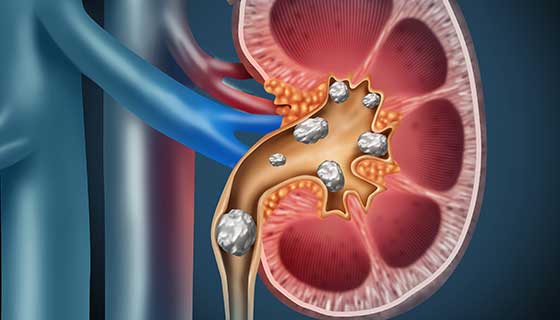What are Kidney Stones?
Types, Diagnosis, Cost of Treatment, Pre-surgery Precautions, and Post-surgery Care
Kidney stones are a common urological problem affecting millions of people worldwide. When these small, hard stone and salt deposits move through the urinary tract, they cause painful trouble. This article will provide you with in-depth information about kidney stones, diagnosis, treatment costs, pre-surgery precautions, post care for kidney stones.
What are Kidney Stones?
Kidney stones are hard stones that develop in the kidneys due to the formation of minerals and salts in the urine. It is an immovable mass of minerals and salts that may be small or big in size. The kidney’s function is to clear waste and extra liquid from the body.
The kidney also filters blood and generates urine, but due to the high amounts of calcium, potassium, and salts in the diet, waste items cannot pass through the kidney entirely. Afterward, all of these waste elements gather and form a stone, which is known as a kidney stone or calculi in medical terms.

Types of Kidney Stones
Kidney stones can happen in a variety of forms, such as:
1 – Calcium Stone
The most prevalent sort of kidney stone is this one. A high level of calcium oxalate causes this.
2 – Cystine Stone
This is seen in very few cases. Cystine is a type of acid found in the body that causes this stone.
3 – Uric Acid Stone
This form of stone is most probably seen in arthritic sufferers. When uric acid is too much in the urine, uric acid stones occur.
4 – Struvite Stone
This is more frequently seen in females with kidney and urinary tract infections. This stone has the potential to be quite big.
Causes of Kidney Stones
The primary causes of kidney stones are as follows.
A lack of water
One of the most common causes of kidney stones is a lack of water in the body. When the kidney filters minerals, it requires a sufficient quantity of water.
Family History
If someone in your family has kidney stones, you may be more likely to have them, too.
Digestive Diseases
If you have digestive problems or have had surgery that affects your gastrointestinal tract, these can affect your body’s absorption of certain chemicals, leading to the development of stones.
Lack of Physical Activity
Being inactive can affect your body’s ability to handle calcium, which raises your risk of forming stones.
.
Symptoms of Kidney Stones
Here is a list of significant symptoms of kidney stones.
Painful Urination
When you want to use the restroom, but it hurts a lot.
Stomach Issues
When you have regular stomach aches or pains
Back Pain
When your lower back hurts for no particular reason.
Blood in the Toilet
Seeing red spots in the bathroom after or while urinating. This is not a good sign!
Pain in Private Part
Feeling uncomfortable while peeing. That’s not good
Diagnosis of Kidney Stones
The doctor gives the following suggestions to identify kidney stones
Blood Tests
Doctors look for extra calcium or uric acid in blood testing. Blood testing, kidney health exams, and other medical examinations are required.
Urine Test
Doctors test this to determine whether your urine has more stone-forming minerals or fewer chemicals preventing stone development.
Imaging Tests
The doctor can see your kidney stone in these tests. This test includes an X-ray USG or a CT scan. Imaging tests are the most reliable method to find the size and location of kidney stones with utmost precision.
Precautions to be Taken Before Kidney Stone Surgery
Patients must take specific precautions before kidney stone treatment. Here are some important steps to be taken:
1- Consult a Specialist Urologist – Ensure that you have consulted a qualified urologist or kidney specialist who can properly assess your condition and recommend the most appropriate treatment option. At Aapkacare health, we have the best urologist doctor to solve all your kidney-related problems.
2 – Medical History –Tell your doctor a detailed medical history, including past operations, allergies, medicines, and ongoing health issues.
3 – Stay Hydrated – keep yourself well-hydrated before the surgery, as it can help improve kidney function and help clear tiny stones.
4 – Fasting – Your doctor can advise you to avoid eating before the surgery for a particular period of time.
Post-Operative Care After Kidney Stone Surgery
After kidney stone surgery, proper post-operative care is essential to ensure a quick and painless recovery. Here are some general guidelines.
1 – Follow Medications – To control pain and avoid infection, take all prescription medicines as instructed by the doctor.
2 – Follow-up Appointments – Attend all scheduled follow-up Appointments to keep track of your recovery progress.
3 – Hydration – Drink lots of water to remain hydrated. The health of your kidneys depends on proper hydration.
4 – Diet Plan – After surgery, you may need to follow a healthy diet for a few days. Your doctor will provide you with a complete diet plan.
Types of Kidney Stone Surgery
Kidney stones are handled similarly in both adults and kids. Firstly, the Doctor tries to remove the stone without doing surgery, you are probably advised to drink lots of water. You can also be given medication to reduce the acidic nature of your urine. However, surgery is required to remove it if it is too big, blocks the passage of urine, or shows signs of infection. The surgical techniques URSL, PCNL, and RIRS are all used to treat kidney stones. Here’s a summary of each.
1 – URSL (Ureteroscopic Lithotripsy) – URSL is an elective procedure used to remove kidney stones from the urinary tract or kidney. This process is usually preferred for lower ureteric stones of sizes 10 mm to 15 mm. The instrument allows the surgeon to see the stone, and different devices, such as a laser or a tiny container, are used to break the stone into smaller parts. The stone parts can generally be simply removed or allowed to flow naturally via the urine.
2 – PCNL (Percutaneous Nephrolithotomy) –PCNL is a surgical treatment used to remove large kidney stones or stones that are difficult to reach using other procedures. The surgeon makes a small cut in the patient’s back and creates a tunnel directly into the kidney. After passing the nephroscope through the cuts, the stone is broken into smaller pieces using a laser or other energy sources.
3 – RIRS (Retrograde Intrarenal Surgery) – Another surgery is used to remove stones that build up inside the kidney. A flexible ureteroscope is inserted into the urethra and pushed through the urinary system to the kidney. The surgeon can view the stone and use a laser or other equipment to break it into smaller pieces. The broken stones are then removed or passed out through urine.
The Cost of Kidney Stones in India
In India, the cost of Ureteroscopic Lithotripsy (URSL) starts from Rs 65,000 and can go up to Rs 80,000. The cost of Retrograde Intrarenal Repositioning Surgery (RIRS) ranges from Rs 50,000 rs to Rs 1,80,000 and Percutaneous Nephrolithotripsy (PCNL) costs between Rs 40,000 to Rs 1,50,000.
However, the cost varies depending on a number of factors. So it is best to first consult a doctor and clear all your doubts.
Conclusion
In the end, kidney stones are a typical disease that can be painful. Successful kidney stone treatment requires early diagnosis, proper therapy, and post-operative care. According to healthcare professional advice, people can reduce their risk of getting kidney stones and live a better life by taking precautions.



